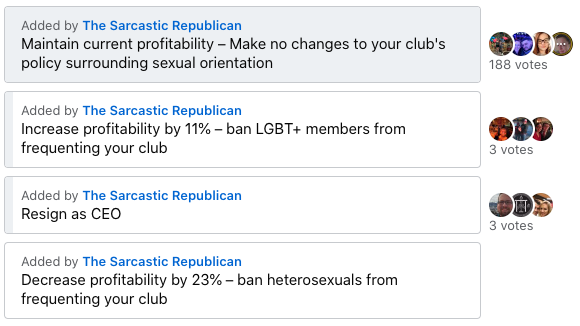Imagine you’re the CEO of the largest nightclub in Houston, TX.
Currently, your club serves people of all races, religions, and sexual orientations. Around 80% of the patrons are heterosexuals while 20% are from the LGBT+ community.
You hire an outside consultant to analyze the club’s operations and profitability; here was the key finding:
At this club, on average, heterosexuals spend more money than members of the LGBT+ community.
The consultant then lists the following options:
– If the club stops catering to the LGBT+ community (by explicitly stating that LGBT+ members are not welcome), your club will now have close to 95% of heterosexual patrons. The net impact of this demographic shift leads to an increase in profitability by 11% for the club. This is a longterm profitability consequence.
– If the club stops catering to the heterosexual population (by explicitly stating that they are not welcome), your club will now have close to 95% LGBT+ patrons. The net impact of this demographic shift leads to a decrease in profitability by around 23%. This is a longterm profitability consequence.
– If the club makes no changes to its policies, it will maintain its current level of profitability for the longterm.
For the purposes of this thought experiment, assume you have the legal right to make these policy changes within your own club.
As CEO, from the options above, what decision do you make?

The above are the results from the poll that I administered in my political group – Civil Political Discourse 🇺🇸
Facebook interviewed me personally back in October, 2020, and commended me for being able to host healthy, political conversations. My group is sorely lacking a robust Democratic/Progressive presence, so if you fall on the left side of the isle, I doubly encourage you to join. That being said, we welcome members of any political affiliation.
If you’re interested in seeing the rest of the commentary or participating in future thought experiments, I invite you to join my group.



